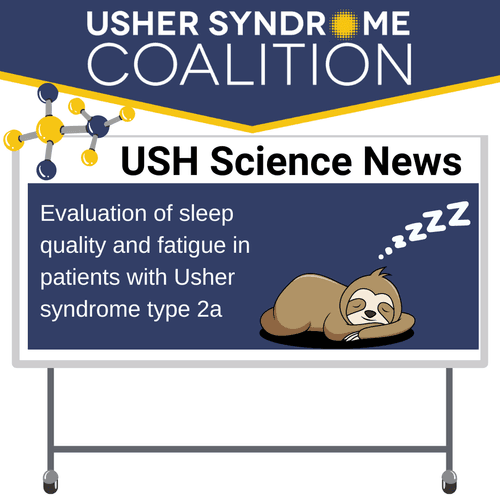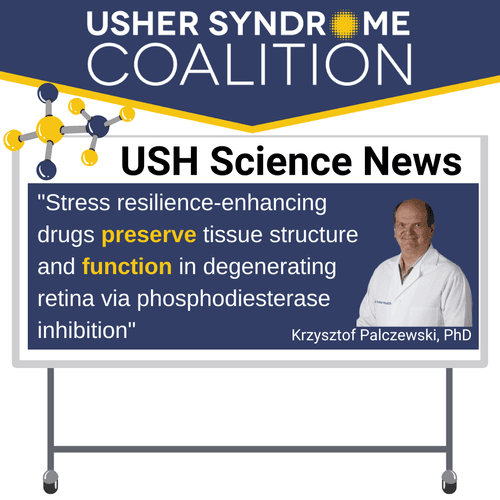Grounded in Science
A balance of research news and well-being for the Usher syndrome community.
Happy June! Time is flying by. Congratulations to any recent graduates!
Have you registered for an USH Local Social yet?
We have two exciting events planned for this summer: one in Boston, Massachusetts, and the other in Carnation, Washington. There will be additional events in September, with more information to come. Find or organize an USH Local Social near you. Register now as space is limited!
Just a reminder to join the Usher Syndrome Data Collection Program (USH DCP) to help expand and improve medical research. By participating, you can begin the first step in making your de-identified patient information available to researchers. By generating the most comprehensive data collection effort for the Usher community, we can accelerate research and the development of treatments and therapies.
Have you joined the Usher Syndrome Coalition Discord Community Server? It’s a safe place for the community to connect with each other.
Join here: https://discord.gg/czwHGaDu7W
Research Spotlight
Evaluation of Sleep Quality and Fatigue in Patients with Usher Syndrome Type 2a
In a recent publication in Ophthalmology Science, researchers at Radboudumc sought to study the significance of sleep problems and fatigue experienced by Usher syndrome type 2a (USH2a) patients. They hypothesized that sleep problems could be a symptom of Usher syndrome, in addition to the loss of hearing and vision. It is interesting to note that sleep problems in patients were not related to the severity of vision loss and were reported even before the patients exhibited vision loss. These observations set the stage for further research. As a follow-up, researchers plan to substantiate the results of this study by evaluating whether the zebrafish model for Usher syndrome exhibits a disturbed sleep pattern and whether Usher syndrome-associated proteins play a role in sleep regulation.
What this means for USH: Recognition of sleep problems as a comorbidity of Usher syndrome, rather than a side-effect of the dual-sensory loss, would be a step towards improved personalized patient care.
DISCLAIMER: The Usher Syndrome Coalition does not provide medical advice nor promote treatment methods. USH Science News is intended to help summarize more complex literature for the community to use at their own discretion.
For more, check out our Current USH Research page specific to USH subtype as well as gene-independent therapeutic approaches.
In Case You Missed It: Science News Feature
Stress resilience-enhancing drugs preserve tissue structure and function in degenerating retina via phosphodiesterase inhibition
Progressive retinal diseases such as age-related macular degeneration (AMD) and retinitis pigmentosa are caused by retinal degeneration due to apoptosis, or cell death due to cell stress. Cells can become imbalanced or stressed due to unfavorable environmental conditions such as exposure to bright lights, smoking or high alcohol consumption. When stressed, cells will either survive by activating a pathway that allows the source of the stress to be neutralized, or they will die via apoptosis.
In this study, researchers focused on a class of enzymes called phosphodiesterases (PDEs), which are commonly present in the human body. These enzymes are capable of activating distinct pathways that promote cell survival along with other pathways that trigger cell death.
They discovered inhibition of PDEs with targeted drug therapy led to cell adaptation and survival, sometimes to a cell state that is even healthier than unstressed cells.
What this means for Usher syndrome: Drug therapy is a common and accepted way to manage disease treatment. The promising results from this study indicate that one day, patients with retinal degenerative disorders may be able to slow vision loss and retinal degeneration through a prescribed drug therapy or regimen.
For more science news, check out our Science News page, organized by treatment approach and type of Usher syndrome.
On Well-Being: Fear of the Unknown
Although uncomfortable, fear is a natural emotion that can protect us from harm. For example, looking both ways before crossing the street is a habit driven by fear of being hit by a car...
USH Life Hack of the Month
(Send your USH life hacks to info@usher-syndrome.org.)
While canes and guide dogs are common assistive tools for those with vision impairment, don’t forget your own smartphone can become an assistive device! Many apps have been developed for our community, such as Be My Eyes, which connects you with a live, sighted person via video feed to help you with your tasks. A new AI-driven app called Oko provides assistance in detecting and navigating traffic signals so that you can cross the street safely.
The Oko App is a free, downloadable program that uses your phone’s back camera to scan your surroundings and provides feedback via audio signals and/or haptics. To use, launch the app, and hold your phone up at chest height so that the rear camera is facing the street in front of you. Slowly rotate to the left and right about 180 degrees to allow the detection of traffic lights. Once found, the app detects signal light changes and notifies you accordingly to help you cross the street safely and within marked pedestrian crosswalks.
For more information, visit: Oko App
View a tutorial from Sam of The Blind Life here: https://youtu.be/v1MvczKZQYs









